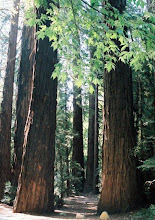A friend once made me a sign that I had on my office door for years. It's a picture showing 4 cowboys complete with big mustaches and six guns. Their arms are on their hips and they don't look happy. Underneath, my friend put the caption, "We want singable hymns". He made the sign after spirited discussions during a hymn-writing conference. Any pastor soon finds out that the most common complaints about worship are about hymns that are unfamiliar or are 'hard to sing'. That's one side of the discussion. Other people are tired of hymns that are 'boring, slow, and old'; they want new music and worship that has 'spirit and joy'.
Although people often think of themselves as being on opposite sides, I have noticed one thing they seem to hold in common: at the base is the concern of what they want from worship. If television/mega church is an example, people want to be entertained and moved by what is presented while they sit and watch. As a small town/rural pastor, there is no way I can compete with all the musicians and glitz and production especially when I pick the wrong (unsingable and unfamiliar) hymns like I did recently.
The conversations I have had since then got me to thinking about our expectations about worship and what we bring to the table physically and spiritually.
The ancient word for what happens in worship is "liturgy" which literally means work of the people. The understanding is that worship happens when the people assemble and together to the reading, praying, and singing. In the new testament church worship is not only participation in word and prayer but also it is also preparation for ministry.
When early Christians gathered for worship on the first day of the week (Sunday), they brought their gifts of food and money. After worship and sharing the Lord's Supper, those gifts were taken and distributed to the poor, widows and orphans, and the sick. Worship and communion led directly to ministry to those in need. People worked together to make worship happen and then worked at doing the ministry Christ put into the hands of the church.
It is an ancient premise of the Church that our prayer shapes our ministry; 'as we pray, so we do'.
Those of us whose work includes the preparation of worship and the preaching of the word, really do need to take that responsibility seriously and do our best. As one seminary professor told us, just because we know and believe that God is at work in worship doesn't mean we are off the hook. To take God seriously is to take worship seriously both for those of us in the pulpit and those in the pew. We need to take our cue from the early church who came to pray and be nourished by the Word to go forth and do the ministry of Christ.
The ancient pattern for worship teaches us to come bringing our gifts, ready to share and to participate in the work of liturgy and caring for those in need. It calls us out of ourselves and our needs to focus on what we bring to God and then bring to the world on God's behalf. The words often prayed by preachers are good words for everyone who comes to worship: "Let the words of my mouth and the meditation of my heart be acceptable to you, O Lord, my rock and my redeemer." (Psalm 19:14)
Instead of coming to worship looking for what we are to get out of the experience, scripture points us in the direction of the preparation of ourselves and the gifts we bring to the "liturgy" - the work of God's people. Our prayer and meditation as we read together even in this humble devotion is part of what we bring to God in thanksgiving for our salvation. As the refrain says from one of my favorite, oh so singable hymns, "No storm can shake my inmost calm while to that Rock I'm clinging. Since Christ is Lord of heaven and earth, how can I keep from singing?" Read Psalm 104:31-34.
Saturday, January 22, 2011
Tuesday, January 4, 2011
Keep the Lights Burning!
When I was growing up in Texas, I remember December 26th not as a day for shopping all of the after Christmas sales but as a sad day for Christmas trees. On that morning, the curbs were littered with Christmas trees taken out and left for garbage pick-up. Many of them still bore their strands of tinsel or fake snow flocking and occasionally you could see stray ornaments still clinging to their branches. Not only was Christmas over but it was kicked out to the curb.
No wonder I was the envy of my friends; Lutherans (and all churches that follow the liturgical church calendar) celebrate twelve days of Christmas and so it was still Christmas at my house. The tree was still lighted and there were still cookies and treats and Christmas music. I was glad for the song "The Twelve Days of Christmas" because it gave proof to my argument for why we still had our tree up and decorated.
Perhaps living in the dark winter of the Arctic night explains why the Scandinavians have held on fast to the tradition of keeping the twelve days and celebrating Epiphany. That allows for having the Christmas lights shine brightly through the darkest and often coldest part of the year. Also a celebration of light, Epiphany is the day when the church calendar marks the visit of the magi. They followed the bright star in the sky until it led them to Bethlehem and the Christ child. The gospel story contrasts the darkness of the night and of Herod's evil intent and actions with the light that guides them to God's gift of grace.
Welcoming the light in the midst of darkness is not just a winter theme but it is also a symbol of safety from the dangers found in dark places and of the light of truth and love overcoming hatred and evil. Where we struggle to find our way in the dark, stubbing our toes, and fighting fears, God breaks in with love, truth, and grace. John says of the coming of the Christ: "in him was life and the life was the light of all people. The light shines in the darkness, and the darkness did not overcome it." (John 1:4-5)
Take time these last days of Christmas to mark the true gift of Christmas, the Word made flesh, some to earth and living among us. For Jesus has not left us: "Where two or three are gathered in my name, I am there among them". (Matthew 18:20) These are not a formula of how to conjure up Jesus but they are words of promise and of instruction for those who follow Jesus. When Christians gather together, we are the body of Christ and we need to live that out in word and deed. That the world does not always see Christ in the actions of the Church is proof of our weakness and need of repentance.
The light of Christ shines in the darkness when we show God's love to those in need around us. Everyone we meet needs the giving of that love and grace and it happens (or not) through each of us. You can't give enough of it away - God is an abundant and reckless giver, heaping grace upon grace. The weeks after Epiphany and before Lent call us to shine the light of Christ into the world through our words, our actions, and our lives. Read John 1:14-18
No wonder I was the envy of my friends; Lutherans (and all churches that follow the liturgical church calendar) celebrate twelve days of Christmas and so it was still Christmas at my house. The tree was still lighted and there were still cookies and treats and Christmas music. I was glad for the song "The Twelve Days of Christmas" because it gave proof to my argument for why we still had our tree up and decorated.
Perhaps living in the dark winter of the Arctic night explains why the Scandinavians have held on fast to the tradition of keeping the twelve days and celebrating Epiphany. That allows for having the Christmas lights shine brightly through the darkest and often coldest part of the year. Also a celebration of light, Epiphany is the day when the church calendar marks the visit of the magi. They followed the bright star in the sky until it led them to Bethlehem and the Christ child. The gospel story contrasts the darkness of the night and of Herod's evil intent and actions with the light that guides them to God's gift of grace.
Welcoming the light in the midst of darkness is not just a winter theme but it is also a symbol of safety from the dangers found in dark places and of the light of truth and love overcoming hatred and evil. Where we struggle to find our way in the dark, stubbing our toes, and fighting fears, God breaks in with love, truth, and grace. John says of the coming of the Christ: "in him was life and the life was the light of all people. The light shines in the darkness, and the darkness did not overcome it." (John 1:4-5)
Take time these last days of Christmas to mark the true gift of Christmas, the Word made flesh, some to earth and living among us. For Jesus has not left us: "Where two or three are gathered in my name, I am there among them". (Matthew 18:20) These are not a formula of how to conjure up Jesus but they are words of promise and of instruction for those who follow Jesus. When Christians gather together, we are the body of Christ and we need to live that out in word and deed. That the world does not always see Christ in the actions of the Church is proof of our weakness and need of repentance.
The light of Christ shines in the darkness when we show God's love to those in need around us. Everyone we meet needs the giving of that love and grace and it happens (or not) through each of us. You can't give enough of it away - God is an abundant and reckless giver, heaping grace upon grace. The weeks after Epiphany and before Lent call us to shine the light of Christ into the world through our words, our actions, and our lives. Read John 1:14-18
Subscribe to:
Posts (Atom)


